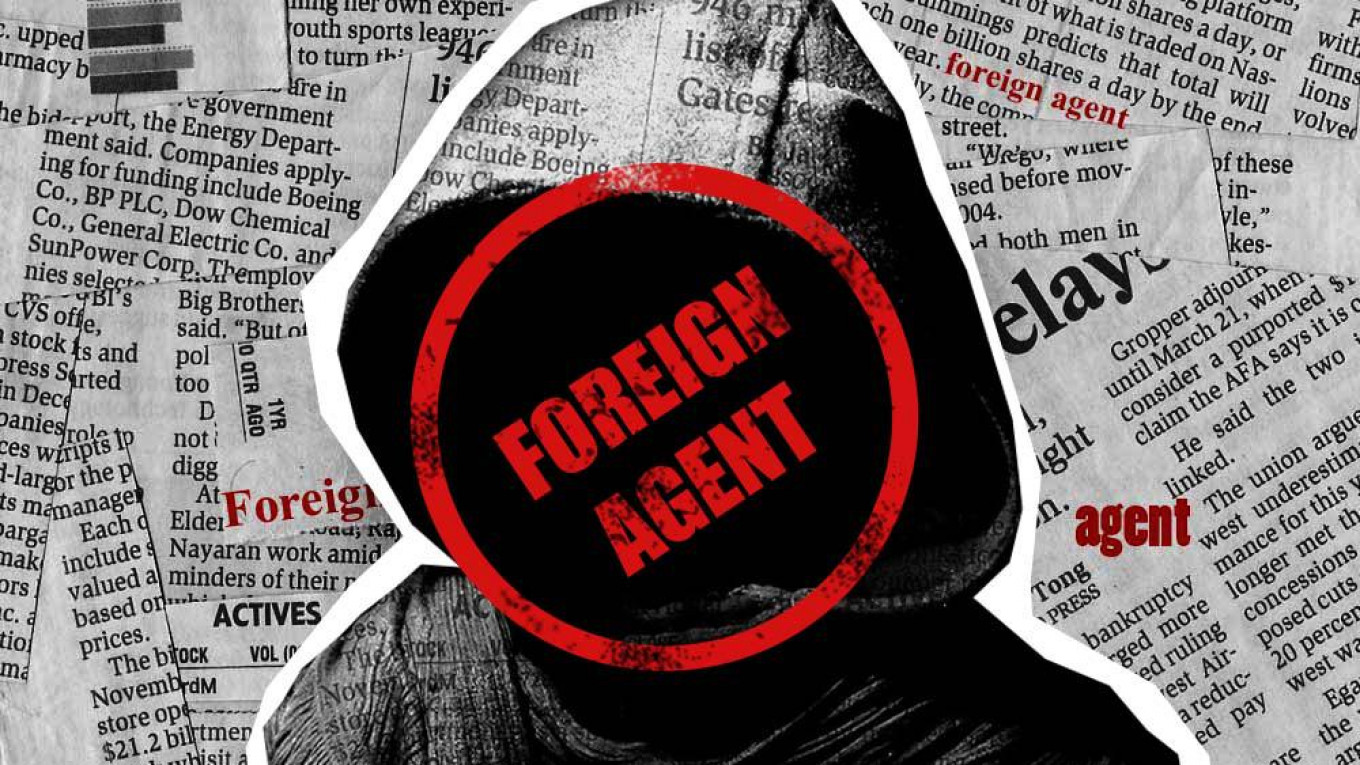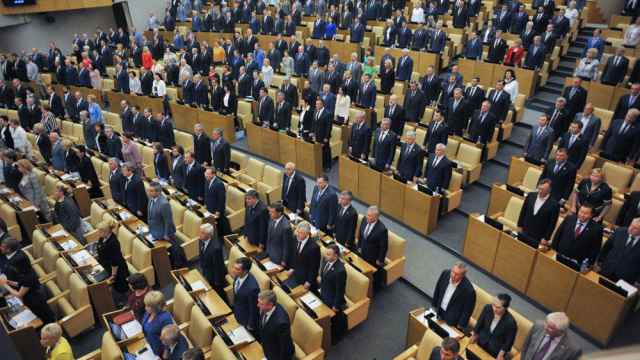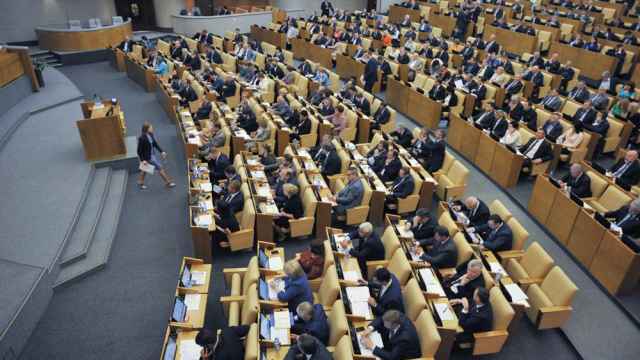Russia’s State Duma, the lower house of parliament, on Nov. 15 passed a bill in its third and final reading that will allow the government to designate media outlets receiving funding from abroad as “foreign agents.”
Amendments to the existing law also include references to blocking the websites of so-called “undesirable organizations.” The Federation Council, the upper chamber of parliament, will approve the media bill on Nov. 22 and President Vladimir Putin will likely sign it into law before the end of the month.
The bill was introduced against the backdrop of a broader political spat between Russia and the U.S. It is Russia’s response to America’s decision last week to restrict Russian media outlets in the U.S., and the latest move in the countries' escalating diplomatic row.
The foreign agent law is unlikely to be used more broadly to restrict the U.S. business community in Russia. But it highlights that the trajectory of the two countries’ persistently poor diplomatic relationship is likely to be the main source of business risk for U.S. investors in Russia.
Upping the ante?
The foreign agent law has been in effect since 2013, although the bill was first proposed in 2012.
It is couched in a Soviet-era lexicon with connotations of espionage that pits Russia against the West. To unpack the terminology, a foreign agent refers to a non-commercial organization financed from abroad that is engaged in political activity.
The label of foreign agent was intended to discredit organizations in Russia, as it suggests they are working against Russia’s interests. An undesirable organization is a foreign non-state organization whose actions are perceived to threaten Russia’s national security or interests.
This is a direct response to the U.S. Justice Department’s decision last week obliging Russian state-controlled media outlets RT and Sputnik to register as “foreign agents” in the U.S.
The reasoning behind this was that these outlets disseminated “disinformation” in the run-up and during the 2016 presidential elections, which U.S. intelligence agencies claim would have influenced voters.
RT has complied with the U.S. authorities, meaning that they must send biannual reports to the U.S. authorities disclosing their foreign funding and their published material must contain disclaimers identifying them as a “foreign agent.”
Putin was clear about Russia’s likely response, maintaining that Russia would respond “proportionately.”
Though Russia certainly has a broader political point to make with the law, it is more about matching recent U.S. actions, and does not necessarily reflect a broader trend of anti-Western sentiment in Russia. Indeed, the Russian authorities have publicly expressed hope that the law will only be used once in retaliation, to restrict specific U.S. media outlets.
Practical and political concerns
The bill itself does not name any media outlets, but the Russian Justice Ministry has warned that U.S. state-owned entities Voice of America, Radio Liberty/Radio Free Europe and privately-owned outlet CNN are likely to be targeted.
The first consequence is a practical concern, as these U.S. media outlets will face increasingly burdensome bureaucratic measures.
To comply with the law, foreign agents must be included on a government register, submit reports to the authorities on their sources of funding and the company’s aims; outline how their funding is spent and identify their managers.
The Justice Ministry must approve each registration on a case-by-case basis. The law also allows the authorities to conduct spot checks on designated foreign agents to ensure their compliance with the law. Companies may have their operating licenses suspended or rescinded if they fail to comply.
The second implication is broader and has a political dimension. The law is vaguely worded and broadly phrased — the definition of ‘funding from abroad’ may refer to grants or financing from any person transferring money from abroad into Russia, regardless of that person’s citizenship, so it is easy to fall foul of the legislation.
There is a risk that the Russian authorities could use this flexibility to restrict foreign media from other countries, or restrict Russian media outlets such as Open Russia, which is sponsored from abroad, in response to any future diplomatic disputes. Russia may also wield this law in response to any restriction of Russian media abroad.
However, it is unlikely that non-U.S. foreign businesses will be targeted by this law.
The reason for this is twofold. First, the Russian authorities do distinguish between events playing out at a diplomatic level, and the business community on the ground in Russia. In principle, foreign investment in Russia remains welcome.
Restricting the operations of U.S. companies would spook other foreign investors. It is noteworthy that while 11 foreign and international organizations have been declared “undesirable,” none of their websites have actually been blocked.
Second, the U.S. business community is a source of soft power pressure for Russia to harness and use to lobby on behalf of its political interests within the U.S. government.
Fundamentally obstructing U.S. investment in Russia is not a tactical move that the authorities will be willing to make for the sake of its broader strategic goals. Certainly, the foreign agent law is likely to target specific news agencies perceived as mouthpieces of the U.S. authorities and party to the U.S. political ‘line’ on Russia. This does not hold true of other U.S. businesses in Russia.
Tit-for-tat
American sanctions will remain in place, and the Russian authorities are considering implementing further legislative changes to include ‘undesirable cooperation’ by Russians with any foreigners that the government assesses as acting against Russia’s interests, another broadly defined term.
The language between the U.S. and Russia is also becoming increasingly hyperbolic. The U.S. intelligence agencies are in the throes of an investigation into Russia’s alleged electoral interference and also on former members of the presidential administration’s personal and business ties with Russia.
Accusations that businessmen such as U.S. Commerce Secretary Wilbur Ross have not declared their stakes in a shipping venture that has Russian clients are used as evidence of collusion. Any links with Russia through politics or business have now become charged and are treated as circumspect.
As mistrust abounds on both sides and shows no signs of improvement, tit-for-tat moves to discredit one another’s governments will continue to affect entities perceived as messengers of the state.
The dynamics of U.S.-Russia relations will remain a key source of business risk in Russia.
Emily Ferris is a political risk analyst covering Russia and Eastern Europe for Control Risks, the international risk consultancy.
The views and opinions expressed in opinion pieces do not necessarily reflect the position of The Moscow Times.
A Message from The Moscow Times:
Dear readers,
We are facing unprecedented challenges. Russia's Prosecutor General's Office has designated The Moscow Times as an "undesirable" organization, criminalizing our work and putting our staff at risk of prosecution. This follows our earlier unjust labeling as a "foreign agent."
These actions are direct attempts to silence independent journalism in Russia. The authorities claim our work "discredits the decisions of the Russian leadership." We see things differently: we strive to provide accurate, unbiased reporting on Russia.
We, the journalists of The Moscow Times, refuse to be silenced. But to continue our work, we need your help.
Your support, no matter how small, makes a world of difference. If you can, please support us monthly starting from just $2. It's quick to set up, and every contribution makes a significant impact.
By supporting The Moscow Times, you're defending open, independent journalism in the face of repression. Thank you for standing with us.
Remind me later.






